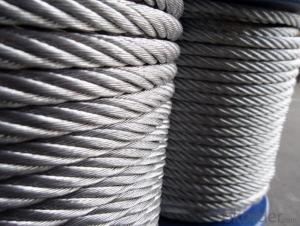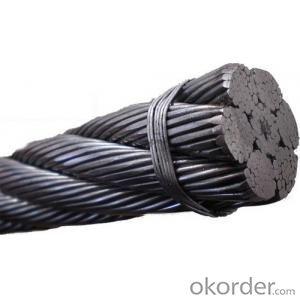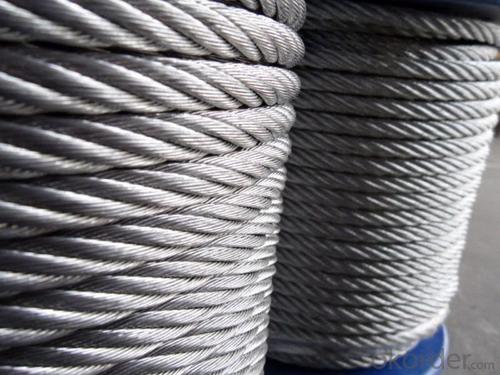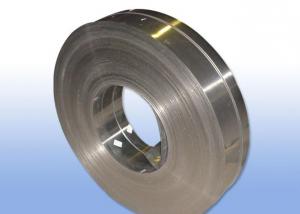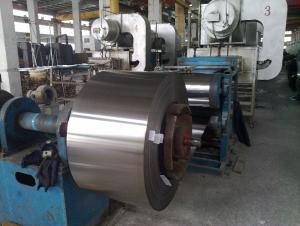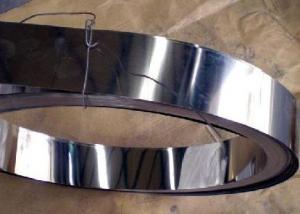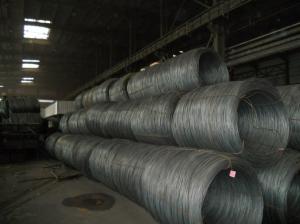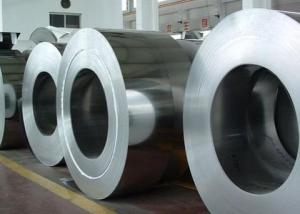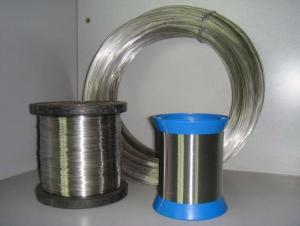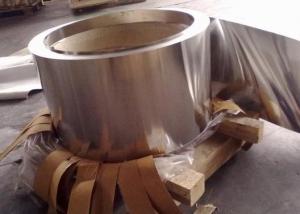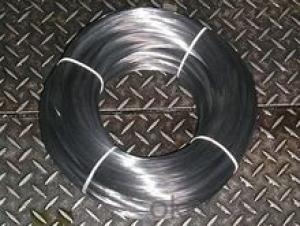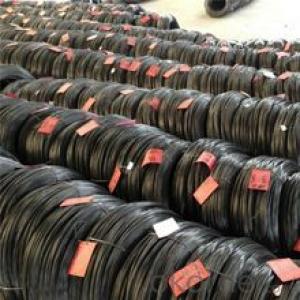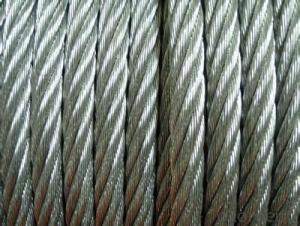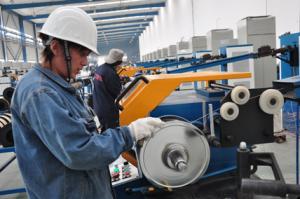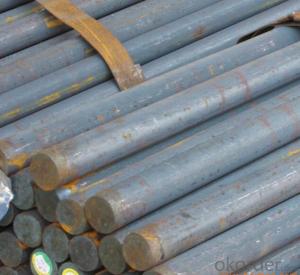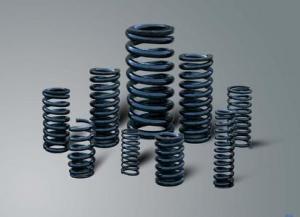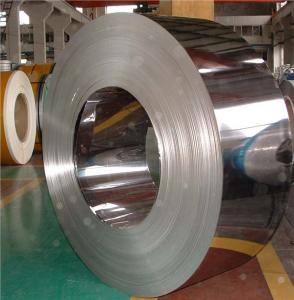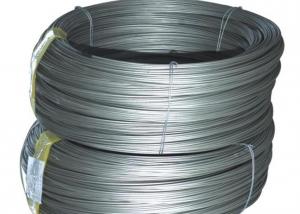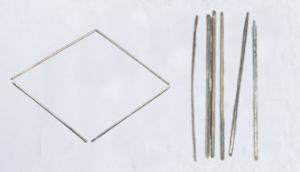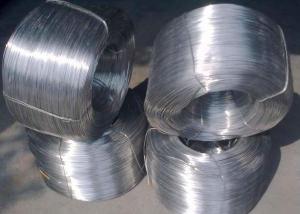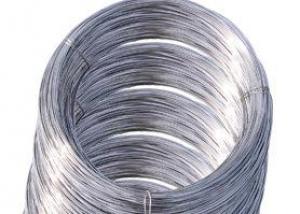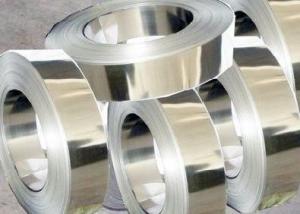Carbon Spring Steel Wire with High Tensile
- Loading Port:
- Dalian
- Payment Terms:
- TT OR LC
- Min Order Qty:
- 5 m.t.
- Supply Capability:
- 10000 m.t./month
OKorder Service Pledge
OKorder Financial Service
You Might Also Like
Specification
Carbon Spring Steel Wire with High Tensile
Steel Grade: | 45#,60#,65#,70#,SWRH72A, SWRH72B,80#,SWRH82B | Standard: | DIN, GB, JIS | Wire Gauge: | 0.2-13mm |
Place of Origin: | China (Mainland) | Type: | Ungalvanized | ||
Alloy Or Not: | Non-alloy | Application: | Making spring,mattress,wire rope |
Packaging Details: | Coil Packing,Z2 Packing,Z3 Packing,Spool Packing. |
Delivery Detail: | Within 10 days |
1.Diameter range:0.2-13mm
2.Main application:making spring,mattress,wire rope.
3.Standard:GB4357,DIN17223,JIS G 3521
High Carbon Spring Steel Wire Performance:
1.Diameter range:0.2-13mm
2.Main application:making spring,mattress,wire rope.
3.Standard:GB4357,DIN17223,JIS G 3521
Standard:DIN17223:
High Carbon Spring Steel Wire | |||
wire diameter(mm) | Tensile Strength(N/mm² ) | ||
Grade A | Grade B | Grade C | |
0.30 | 2370-2650 | ||
0.40 | 2270-2550 | ||
0.50 | 2200-2470 | ||
0.60 | 2140-2400 | ||
0.70 | 2090-2350 | ||
0.80 | 2050-2300 | ||
1.00 | 1720-1970 | 1980-2220 | |
1.20 | 1670-1910 | 1920-2160 | |
1.40 | 1620-1860 | 1870-2100 | |
1.60 | 1590-1820 | 1830-2050 | |
1.80 | 1500-1780 | 1790-2010 | |
2.00 | 1520-1750 | 1760-1970 | 1980-2200 |
3.00 | 1410-1620 | 1630-1830 | 1840-2040 |
4.00 | 1320-1520 | 1530-1730 | 1740-1930 |
5.00 | 1260-1450 | 1460-1650 | 1660-1840 |
6.00 | 1210-1390 | 1400-1580 | 1590-1770 |
7.00 | 1160-1340 | 1350-1530 | 1540-1710 |
8.00 | 1120-1300 | 1310-1480 | 1490-1660 |
9.00 | 1090-1260 | 1270-1440 | 1450-1610 |
10.00 | 1060-1230 | 1240-1400 | 1410-1570 |
11.00 | 1210-1370 | 1380-1530 | |
12.00 | 1180-1340 | 1350-1500 | |
13.00 | 1160-1310 | 1320-1470 | |
Picture
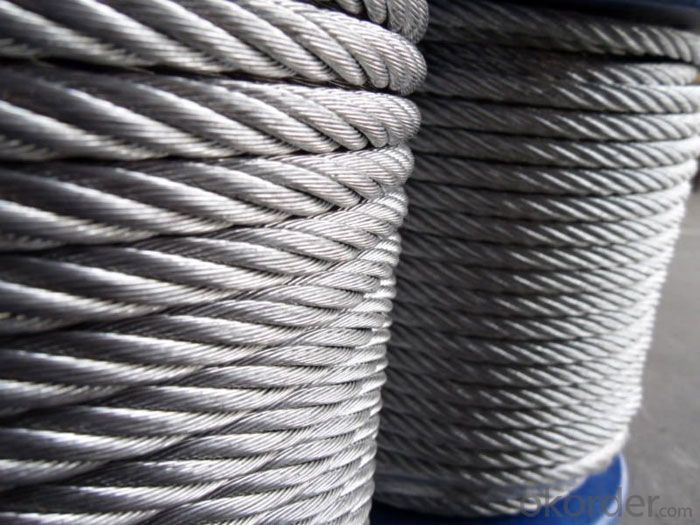
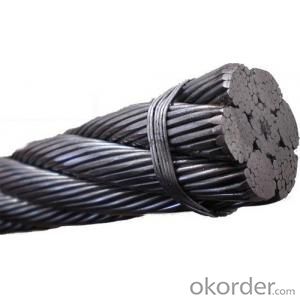
- Q: Can stainless steel wire be used for wire wrapping?
- Yes, stainless steel wire can be used for wire wrapping. Stainless steel wire is a popular choice for wire wrapping as it is durable, strong, and resistant to corrosion. It is often used in jewelry making to create intricate designs and secure gemstones or beads. Stainless steel wire is available in various gauges and finishes, allowing for a wide range of creative possibilities in wire wrapping projects.
- Q: What's the difference between stainless steel screws and galvanized screws? Why are galvanized screws good?
- 5 、 comprehensive protection: every part of the plating can be plated with zinc, even in depressions, sharp corners and hidden places can be fully protected;6, save time and effort: the zinc plating process is faster than other coating construction methods, and can avoid the time after installation on the site brushing.
- Q: Is the inner and outer joint of the water pipe good with copper or stainless steel?
- Copper is good, and it does not rust. Stainless steel is more beautiful, but some quality is not good, with a period of time, the surface of the coating will burst up, which rust.
- Q: Can stainless steel wire be used for springs in the food industry?
- Indeed, stainless steel wire is a viable option for utilizing springs within the food industry. The food industry has a strong preference for stainless steel as it possesses exceptional qualities including remarkable resistance to corrosion, hygienic attributes, and the ability to endure high temperatures and harsh cleansing agents. Stainless steel springs find application in a variety of areas such as food processing machinery, packaging equipment, conveyor systems, and industrial cooking apparatus. The utilization of stainless steel guarantees that the springs remain impervious to rust and contamination, thus ensuring their suitability for employment in food processing and handling. Additionally, stainless steel is effortless to clean and maintain, thereby upholding the integrity and safety of food products.
- Q: Can stainless steel wire be used for bird control applications?
- Yes, stainless steel wire can be used for bird control applications. Stainless steel is a highly durable and resistant material that can withstand harsh weather conditions, including rain and snow. It is also resistant to rust and corrosion, ensuring a longer lifespan for bird control installations. Additionally, stainless steel wire can be easily shaped and manipulated to create various barriers and deterrents that can effectively prevent birds from accessing certain areas. It is commonly used in bird netting, bird spikes, and bird wires to create physical barriers that keep birds away from buildings, structures, or crops. Overall, stainless steel wire is a reliable and effective choice for bird control applications due to its durability and resistance to environmental factors.
- Q: What mould do you use for cold drawn stainless steel wire?. How to deal with before cold drawing?
- A simple, a billet after heating (TV is that burning red hot steel block) refined over several rolling cut edge correction plate become, this is called hot.
- Q: Is stainless steel wire resistant to abrasion?
- Indeed, stainless steel wire exhibits resistance against abrasion. Possessing remarkable durability and strength, stainless steel emerges as a formidable material, effectively combating wear and tear. Its distinctive constitution, comprising chromium and nickel, endows stainless steel with exceptional resistance to corrosion and bolstered strength. Consequently, stainless steel wire boasts a remarkable ability to withstand abrasion induced by friction, rubbing, or scraping against diverse surfaces. Given its invaluable resistance to abrasion, stainless steel wire finds extensive employment in fencing, construction, automotive, and marine sectors. It is indispensable in enduring harsh conditions and extending the wire's lifespan.
- Q: How are stainless steel wire baskets used in industrial applications?
- Stainless steel wire baskets are widely used in various industrial applications due to their durability, versatility, and corrosion-resistant properties. These baskets are specifically designed to withstand harsh conditions, making them ideal for industrial environments where they are subjected to heavy loads, high temperatures, and corrosive chemicals. One common use of stainless steel wire baskets in industrial applications is for material handling and storage. These baskets are used to safely transport and store a wide range of materials, including small parts, components, tools, and equipment. The wire mesh design allows for easy visibility and accessibility of the contents, making it convenient for inventory management and quick identification of items. Another important application of stainless steel wire baskets is in parts washing and cleaning processes. These baskets are used to hold and protect delicate or small components during the cleaning or washing process, ensuring that they are thoroughly cleaned without any damage. The wire mesh design allows for proper drainage and circulation of cleaning solutions, ensuring efficient and effective cleaning. Stainless steel wire baskets are also utilized in heat treatment processes, such as annealing, tempering, or quenching. These baskets can withstand high temperatures and rapid temperature changes without warping or deforming. They are used to hold and transport parts or components during the heat treatment process, ensuring uniform heat distribution and reducing the risk of distortion. In addition, stainless steel wire baskets find applications in the food and beverage industry. They are commonly used for washing, draining, and storing food products, such as fruits, vegetables, or seafood. The stainless steel material is hygienic, easy to clean, and resistant to corrosion, making it suitable for maintaining food safety standards. Overall, stainless steel wire baskets play a crucial role in various industrial applications, providing reliable and efficient solutions for material handling, storage, parts washing, heat treatment, and food processing. Their robust construction, corrosion resistance, and versatility make them a preferred choice for industries that require durable and high-quality equipment.
- Q: What are the different types of stainless steel wire used in electrical resistors?
- There are several types of stainless steel wire that are commonly used in electrical resistors. The specific type of stainless steel wire chosen depends on the requirements of the resistor and its intended application. 1. Type 304 Stainless Steel: This is the most common type of stainless steel wire used in electrical resistors. It is a versatile and widely available material that provides good resistance to corrosion and oxidation. Type 304 stainless steel wire has excellent electrical conductivity and can withstand high temperatures. 2. Type 316 Stainless Steel: This type of stainless steel wire is often used in resistors that are exposed to harsh environments, such as marine or industrial applications. Type 316 stainless steel has enhanced corrosion resistance, particularly against chlorides and acids. 3. Type 321 Stainless Steel: This stainless steel wire is primarily used in resistors that require high temperature resistance. Type 321 stainless steel has excellent resistance to oxidation and can maintain its strength and stability at elevated temperatures. 4. Type 430 Stainless Steel: This type of stainless steel wire is commonly used in resistors that require good resistance to heat and corrosion. Type 430 stainless steel has a higher carbon content, which provides increased strength and hardness. 5. Type 410 Stainless Steel: This stainless steel wire is often used in resistors that require high strength and hardness. Type 410 stainless steel has good resistance to corrosion, but not as good as other types mentioned above. It is commonly used in resistors for applications that involve high mechanical stress. It is important to note that the choice of stainless steel wire for electrical resistors depends on various factors such as the specific application, temperature requirements, and environmental conditions. Manufacturers typically select the most appropriate type of stainless steel wire based on these considerations to ensure optimal performance and durability of the resistor.
- Q: What are the different types of stainless steel wire alloys?
- There are several different types of stainless steel wire alloys, including austenitic, ferritic, martensitic, and duplex stainless steels. Each alloy has unique properties and is suitable for different applications.
Send your message to us
Carbon Spring Steel Wire with High Tensile
- Loading Port:
- Dalian
- Payment Terms:
- TT OR LC
- Min Order Qty:
- 5 m.t.
- Supply Capability:
- 10000 m.t./month
OKorder Service Pledge
OKorder Financial Service
Similar products
Hot products
Hot Searches
Related keywords
